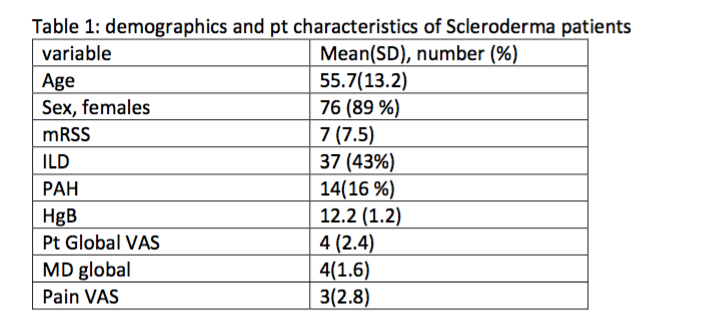Session Information
Session Type: Poster Session (Sunday)
Session Time: 9:00AM-11:00AM
Background/Purpose: Scleroderma (SSc) is a debilitating multi-system chronic disease which directly affects patient related Quality of Life. We wanted to identify how the patient interprets their inability to work and get their perspective on energy levels during daily activities. We hypothesized that there are abnormal constitutional symptoms in SSc patients (i.e. energy levels, sleep quality and time to feeling fatigued) which may directly affect patient productivity. Objective
- To assess the proportion of SSc patients with abnormal energy levels, sleep and with early fatigue.
- To evaluate the relation between energy levels and sleep quality, time to fatigue, pain visual analogue scale (VAS), Pt global VAS, MD global VAS.
Methods: Eighty -five SSc patients meeting the ACR/EULAR 2013 SSc criteria were recruited from Pacific Arthritis Scleroderma Clinic. Laboratory and clinical data were obtained from charts for statistical correlations. Data were cross-sectional and were from the first clinical record available, usually the first clinical visit.
Energy levels were assessed by the question “how is your energy?” and Sleep was ascertained as: ” How well do you sleep?” or “How is your sleep?” For these questions, answers were categorical: “Good” (0), “OK” (1), “Fair”(2) or” Low”(3).
Fatigue was ascertained as “How long after you get up ,do you start to get tired or fatigued?”. Answers were in hours, including 0 for fatigued immediately upon awakening to 12+(maximum); responses were in 0.5-hour increments. Regression modelling used energy levels as the dependent variable and time to fatigue , sleep quality, pain VAS, pt global, MD global as independent variables.
Results: The 85 SSc patients’ characteristics were as follows: mean age 55 (13%), female 76 ILD (37), mean MRSS 7 (±7.5) Table 1. Energy levels were fair-poor in more than 50%, while significantly shortened time to fatigue (< =3 hrs) occurred in 29(34%) ) . Sleep quality was only fair-poor in 37/85(43%) Table 2. Regression model identified fatigue, sleep , pain VAS, patient global and MD as strong predictors of Energy levels in SSc pts (p =0.0001, 0.0001, 0.009,0.0001 and 0.0001 respectively).
Conclusion: Energy levels among other constitutional symptoms (ie, sleep and fatigue ) are significantly altered in SSc patients, more care is to be given to address possible causes , assessment tools and to improve management plans.
To cite this abstract in AMA style:
Suliman Y, Kafaja S, Alemam M, Furst D. Energy Levels: An Overlooked Element in Patient Assessment in Scleroderma [abstract]. Arthritis Rheumatol. 2019; 71 (suppl 10). https://acrabstracts.org/abstract/energy-levels-an-overlooked-element-in-patient-assessment-in-scleroderma/. Accessed .« Back to 2019 ACR/ARP Annual Meeting
ACR Meeting Abstracts - https://acrabstracts.org/abstract/energy-levels-an-overlooked-element-in-patient-assessment-in-scleroderma/


